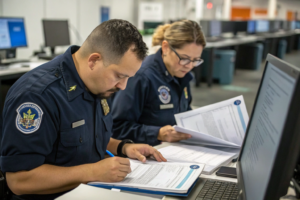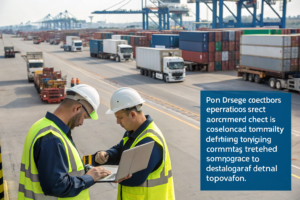International shipping often feels overwhelming for companies that need to move goods across borders. From customs clearance to carrier schedules, the process is full of complex requirements. Many businesses lose time and money when they try to manage it alone.
Freight forwarders simplify these challenges by acting as expert coordinators. They connect shippers with carriers, manage paperwork, and ensure cargo flows smoothly from origin to destination. Their role is not just about booking space; it is about making global trade reliable and efficient.
Working in this industry, I have seen how a good freight forwarder reduces stress for clients. They bring order to a system that can feel unpredictable. Below, I explain the main ways freight forwarders make international shipping simpler.
What Documents Do Freight Forwarders Handle for Clients?
Documentation is one of the hardest parts of global shipping. Each country requires specific forms, and mistakes can cause costly delays.
Freight forwarders prepare and check key documents such as the Bill of Lading (B/L), packing list, and commercial invoice. They also handle certificates of origin, shipper’s export declaration, and other compliance papers.

Why Is the Bill of Lading So Important?
The Bill of Lading serves as both a contract and a receipt between shipper and carrier. If it is wrong, cargo may not be released at the destination. Forwarders ensure every detail matches, reducing risks of disputes or delays.
How Do Forwarders Prevent Customs Issues?
Every shipment must meet customs regulations. Forwarders assign correct HS Codes (Harmonized System Codes), verify tariffs, and ensure compliance with agencies like U.S. Customs and Border Protection. This preparation avoids fines, rejections, or holds at the port.
How Do Freight Forwarders Optimize Transportation Routes?
Global shipping routes are constantly changing due to port congestion, weather, or fuel costs. Businesses often struggle to find the best carrier or route.
Freight forwarders simplify transport planning by comparing multiple carriers and modes of transport. They can recommend ocean freight, air freight, rail, or trucking depending on urgency and cost.

How Does Consolidation Save Money?
Forwarders use consolidation (groupage) services to combine small shipments from different clients into one container. This reduces freight costs and maximizes container space. Platforms like Freightos show pricing options, but forwarders often negotiate even better rates.
Why Is Multimodal Transport Effective?
Using different modes, such as sea plus rail, shortens delivery times and cuts costs. For instance, rail freight between China and Europe has become a faster alternative to sea freight. Forwarders manage the entire multimodal transport process for clients.
How Do Freight Forwarders Improve Cargo Tracking and Security?
Clients want to know exactly where their goods are at all times. Forwarders provide real-time tracking tools and keep shippers updated about delays or changes.
With technology, freight forwarders increase visibility and security across the supply chain. They ensure cargo is monitored from factory to final delivery.

What Technology Tools Do Forwarders Use?
Forwarders work with platforms like Project44 and CargoWise to give clients shipment visibility. These systems reduce the risk of lost or delayed cargo and allow proactive planning.
How Do They Protect Cargo From Risks?
Forwarders advise on cargo insurance and security best practices. They monitor high-value shipments closely and help companies secure policies from firms like Allianz Trade. By addressing risks, they protect clients from unexpected losses.
Why Do Businesses Prefer Freight Forwarders for Efficiency?
For many businesses, efficiency is the top priority. Delays can hurt profits and damage customer trust.
Freight forwarders simplify logistics by offering door-to-door (DDP) services. They manage pickup, customs clearance, and delivery so clients don’t have to coordinate each step separately.

How Do Forwarders Save Time for Businesses?
They handle scheduling, customs, and transport connections. This prevents delays from miscommunication between carriers. Providers like DHL Global Forwarding set benchmarks for seamless logistics.
Why Are Long-Term Partnerships Valuable?
Businesses that work consistently with one forwarder benefit from stable rates, priority bookings, and smoother operations. Organizations following FIATA standards demonstrate reliability across markets. Strong partnerships reduce risks and improve long-term efficiency.
Conclusion
Freight forwarders simplify international shipping by managing documents, optimizing routes, improving visibility, and offering door-to-door services. They help businesses save time, reduce costs, and minimize risks.
For companies shipping from China to markets like the United States or Europe, forwarders turn a complex, uncertain process into a reliable system. With expertise in logistics, they allow businesses to focus on growth rather than shipping problems.









